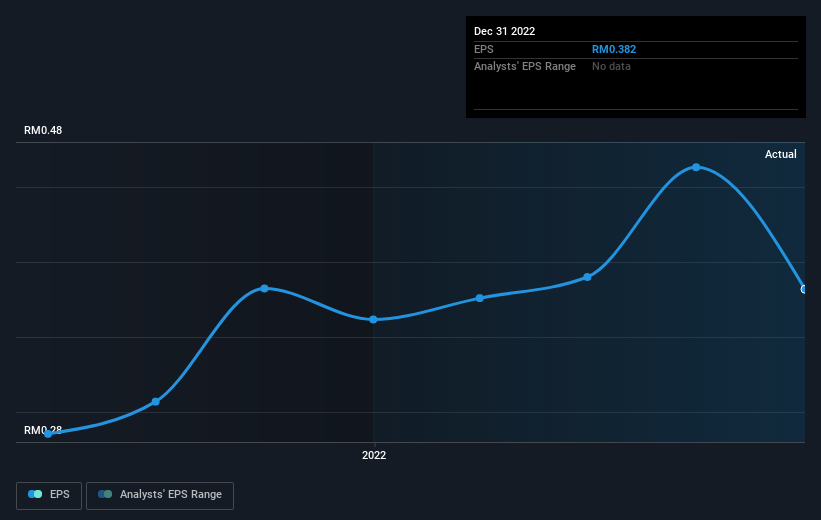- Malaysia
- /
- Industrials
- /
- KLSE:HAPSENG
Investors five-year losses continue as Hap Seng Consolidated Berhad (KLSE:HAPSENG) dips a further 10% this week, earnings continue to decline
For many, the main point of investing is to generate higher returns than the overall market. But the main game is to find enough winners to more than offset the losers At this point some shareholders may be questioning their investment in Hap Seng Consolidated Berhad (KLSE:HAPSENG), since the last five years saw the share price fall 48%. And some of the more recent buyers are probably worried, too, with the stock falling 33% in the last year. Even worse, it's down 28% in about a month, which isn't fun at all. This could be related to the recent financial results - you can catch up on the most recent data by reading our company report.
Since Hap Seng Consolidated Berhad has shed RM1.4b from its value in the past 7 days, let's see if the longer term decline has been driven by the business' economics.
See our latest analysis for Hap Seng Consolidated Berhad
To paraphrase Benjamin Graham: Over the short term the market is a voting machine, but over the long term it's a weighing machine. One way to examine how market sentiment has changed over time is to look at the interaction between a company's share price and its earnings per share (EPS).
During the five years over which the share price declined, Hap Seng Consolidated Berhad's earnings per share (EPS) dropped by 2.9% each year. This reduction in EPS is less than the 12% annual reduction in the share price. This implies that the market is more cautious about the business these days.
The image below shows how EPS has tracked over time (if you click on the image you can see greater detail).

It might be well worthwhile taking a look at our free report on Hap Seng Consolidated Berhad's earnings, revenue and cash flow.
What About Dividends?
When looking at investment returns, it is important to consider the difference between total shareholder return (TSR) and share price return. Whereas the share price return only reflects the change in the share price, the TSR includes the value of dividends (assuming they were reinvested) and the benefit of any discounted capital raising or spin-off. Arguably, the TSR gives a more comprehensive picture of the return generated by a stock. In the case of Hap Seng Consolidated Berhad, it has a TSR of -38% for the last 5 years. That exceeds its share price return that we previously mentioned. And there's no prize for guessing that the dividend payments largely explain the divergence!
A Different Perspective
We regret to report that Hap Seng Consolidated Berhad shareholders are down 30% for the year (even including dividends). Unfortunately, that's worse than the broader market decline of 3.8%. However, it could simply be that the share price has been impacted by broader market jitters. It might be worth keeping an eye on the fundamentals, in case there's a good opportunity. Unfortunately, last year's performance may indicate unresolved challenges, given that it was worse than the annualised loss of 7% over the last half decade. Generally speaking long term share price weakness can be a bad sign, though contrarian investors might want to research the stock in hope of a turnaround. It's always interesting to track share price performance over the longer term. But to understand Hap Seng Consolidated Berhad better, we need to consider many other factors. Like risks, for instance. Every company has them, and we've spotted 4 warning signs for Hap Seng Consolidated Berhad (of which 2 are a bit concerning!) you should know about.
Of course Hap Seng Consolidated Berhad may not be the best stock to buy. So you may wish to see this free collection of growth stocks.
Please note, the market returns quoted in this article reflect the market weighted average returns of stocks that currently trade on Malaysian exchanges.
Valuation is complex, but we're here to simplify it.
Discover if Hap Seng Consolidated Berhad might be undervalued or overvalued with our detailed analysis, featuring fair value estimates, potential risks, dividends, insider trades, and its financial condition.
Access Free AnalysisHave feedback on this article? Concerned about the content? Get in touch with us directly. Alternatively, email editorial-team (at) simplywallst.com.
This article by Simply Wall St is general in nature. We provide commentary based on historical data and analyst forecasts only using an unbiased methodology and our articles are not intended to be financial advice. It does not constitute a recommendation to buy or sell any stock, and does not take account of your objectives, or your financial situation. We aim to bring you long-term focused analysis driven by fundamental data. Note that our analysis may not factor in the latest price-sensitive company announcements or qualitative material. Simply Wall St has no position in any stocks mentioned.
About KLSE:HAPSENG
Hap Seng Consolidated Berhad
An investment holding company, engages in the plantation, property investment and development, credit financing, automotive, trading, and building materials businesses in Malaysia and internationally.
Excellent balance sheet with proven track record.
Similar Companies
Market Insights
Community Narratives



